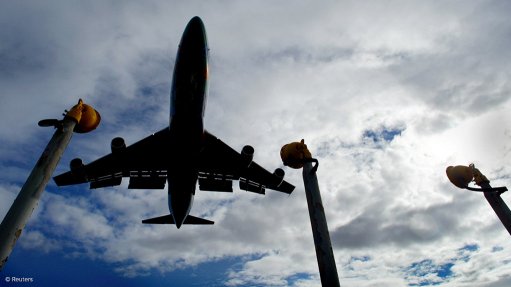
Photo by: Reuters
In the drive to achieve net-zero carbon dioxide emissions aviation by 2050, Africa potentially has a great advantage, International Air Transport Association (IATA) regional VP Africa and the Middle East Kamil Al-Awadhi points out. IATA is the global representative body for the airline industry, and he was addressing the fifty-fifth annual general meeting of the African Airlines Association (AFRAA), in Entebbe, Uganda.
The aviation industry and the intergovernmental International Civil Aviation Organisation (ICAO) have both committed themselves to achieving net-zero aviation by 2050. They have both adopted the Carbon Offsetting and Reduction Scheme for International Aviation (Corsia). This is a market-based and harmonised approach to reducing aviation carbon emissions.
IATA’s Net-Zero Roadmaps indicate that the “heavy lifting” in reaching the 2050 target will have to be done by sustainable aviation fuels (SAF). These could account for 65% of the cuts in aviation emissions by 2050, the rest coming from new powerplant technologies, aircraft design efficiencies, carbon offsetting and carbon capture.
But the great increase in SAF production that will be required will be dependent on supportive policies from governments, that need to be implemented soon, and effectively. And there will also need to be a diversification of SAF feedstocks, to allow production in all regions of the world, as well as to ensure that SAF prices become competitive.
“Africa holds significant potential for the development and deployment of SAF,” he highlighted. “For example, a comprehensive research study headed by [the World Wide Fund for Nature] found that South Africa has the immediate technical potential to produce 3.2[-billion] to 4.5-billion litres of SAF annually, following the strictest sustainability requirements.”
Africa has a “huge advantage” when it comes to producing SAF. Doing so will strengthen the continent’s energy independence, energy security and resilience. However, developing SAF production in Africa could only make limited progress once the correct policy frameworks were put into place. These will require governments to develop all-stakeholder-inclusive national strategic plans to make aviation sustainable.
IATA and AFRAA have aligned positions regarding SAF and other alternative aviation fuels, he noted. They both seek to support airlines to achieve the goal of net zero by 2050, including helping airlines to develop their knowledge and skillsets with regard to SAF. And they both were engaging in advocacy work with governments to ensure that they actually implemented Corsia, and other international undertakings, such as ICAO’s Long-Term Aspirational Goal for net-zero carbon emissions international aviation by 2050.